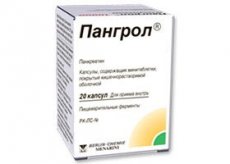Medical expert of the article
New publications
Preparations
Pangrol
Last reviewed: 23.04.2024

All iLive content is medically reviewed or fact checked to ensure as much factual accuracy as possible.
We have strict sourcing guidelines and only link to reputable media sites, academic research institutions and, whenever possible, medically peer reviewed studies. Note that the numbers in parentheses ([1], [2], etc.) are clickable links to these studies.
If you feel that any of our content is inaccurate, out-of-date, or otherwise questionable, please select it and press Ctrl + Enter.

Pangrol has proteolytic, lipolytic, and besides this amylolytic properties. Used to fill the deficiency of pancreatic enzymes.
 [1]
[1]
Indications Pangrol
Pangrol can be used as a substitute drug for exocrine pancreatic insufficiency of various origin: in chronic form of pancreatitis, and in addition with pancreatectomy, dyspepsia, cystic fibrosis, and also after irradiation. The cause may also be bloating or diarrhea, which is non-infectious in nature.
In addition, the drug is indicated for the elimination of various disorders in the process of digestion (after the operation for resection of the stomach together with the small intestine). It also helps in digesting heavily digested fatty or plant foods (or unaccustomed to the body) with a slow-moving life rhythm. Used to eliminate disorders in the operation of the chewing apparatus and with prolonged immobility.
It is used for the treatment of Remkheld's syndrome, but also during the preparatory period before radiographic and other peritoneal examinations (to perform degassing of the intestine).
Release form
Produced in the form of capsules. One polypropylene jar contains 20 or 50 capsules, as well as silica gel (desiccant). One package contains 1 jar with capsules.
Pharmacodynamics
The main active component of the drug is pancreatin (digestive enzyme). This component takes part in the process of digesting proteins and fats with carbohydrates. Drug activity is due to the activity of enzymes that are part of the drug (this is trypsin and lipase, and besides this, amylase with chymotrypsin). The most important value in the treatment process is the functional activity of the lipase, as well as the content of the trypsin substance. But the amylolytic properties of the drug are relevant only when cystic fibrosis is eliminated.
Pancreatic enzymes stabilize the digestive processes, and also help to improve the functional activity of this system. Trypsin is able to inhibit the excretory activity of the prostate, and also provide analgesic effects.
Pharmacokinetics
The capsule shell is resistant to acid, which helps protect enzymes from the effects of hydrochloric acid (during passage of the capsule through the stomach). Inside the small intestine, dissolution of the membrane occurs, resulting in the release of enzymes. They reach peak activity 40-45 minutes after oral administration.
 [4]
[4]
Dosing and administration
Do not chew the medicine - you should drink it with water or juice (1 glass). If there is such a need, it is allowed to open the capsule with the mini-tablets inside, and then dissolve its contents in a glass with liquid.
Dosages of Pangrol are selected individually, in proportion to the severity of the digestive disorder. Usually it is recommended to drink before meals in the amount of 1-2 pieces (for Pangrol 20 000 or 25 000) or 2-4 pieces (for Pangrol 10 000). You can increase the dose only with the appointment of a doctor, depending on the severity of the violation of the digestive function.
Children over 12 years of age and adults are allowed to consume no more than 15-20 thousand units / kg of lipase per day; at absolute exocrine insufficiency for a day 400 thousand ED are accepted.
Dosage of the medication, as well as the duration of treatment in children aged 3-12 years old must be selected by the attending physician. Usually, for a child, the dosage is calculated in a ratio of at most 1500 U / kg of lipase. Children under the age of 1.5 years a day are assigned 50 thousand units, and at the age of more than 1.5 years the dosage is 100 thousand units.
 [5]
[5]
Use Pangrol during pregnancy
During this period, Pangrol is prescribed only in those situations when the expected positive impact on the mother's condition exceeds the possible development of negative consequences for the fetus.
Contraindications
Among the contraindications: acute form of pancreatitis or exacerbation of its chronic form, as well as individual intolerance of the components of the drug.
Side effects Pangrol
Due to the use of the medicine, such adverse reactions can occur: abnormalities in the work of the digestive tract (such as diarrhea or constipation, nausea, pain inside the epigastrium).
Due to the prolonged intake of large doses of drugs, hyperuricosuria may develop.
In patients with cystic fibrosis, taking higher doses of the drug can trigger the onset of constrictions in the ileocecal valve or inside the ascending colon.

Storage conditions
Pangrol should be kept in a temperature that does not exceed 25 degrees.
 [8],
[8],
Shelf life
Pangrol is allowed to be used within 2 years from the date of manufacture of drugs. But after the opening of the pack, the shelf life is no more than six months.

Attention!
To simplify the perception of information, this instruction for use of the drug "Pangrol" translated and presented in a special form on the basis of the official instructions for medical use of the drug. Before use read the annotation that came directly to medicines.
Description provided for informational purposes and is not a guide to self-healing. The need for this drug, the purpose of the treatment regimen, methods and dose of the drug is determined solely by the attending physician. Self-medication is dangerous for your health.

